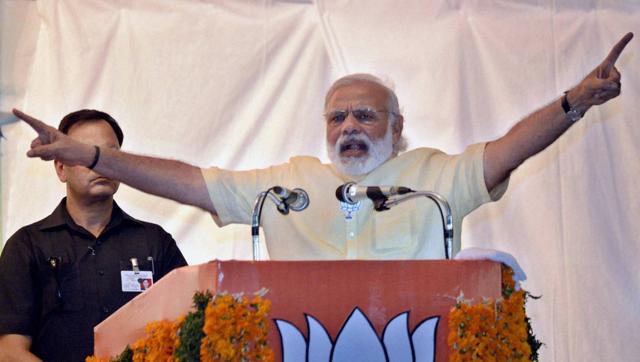“National Security, Holier Than ‘Human Security’ In India”
By K.M Seethi
14 May, 2016
Countercurrents.org

The leaders of the ‘holy’ land of India who make ‘poverty and starvation deaths’ as political ‘weapons’ against their respective opponents must relook the colossal amount being spent on weapons and their guards every year in the name of ‘national security.’ How much money the government can set apart for ‘food security’ and ‘health security’ of millions of such people whose status is now derogatorily compared with Somalia?
Obviously, Prime Minister Narendra Modi had least respect for ground realties, while addressing people in the election campaigns underway in different states, especially when he deploys statistics to denigrate a state like Kerala. Speaking on Kerala’s ‘development tragedy’ (not trajectory), he said that the child mortality rate among the /ST population in Kerala is much worse than the situation in Somalia! The methodology of comparison was fraught with dangerous consequences, besides his statistical skulduggery. The UNICEF says that the mortality rate in Somalia is amongst the highest in the world; one out of every seven Somali children dies before seeing their fifth birthday (137 deaths/1,000 live births) with a higher number in south and central Somalia. Is this the situation among the SCs and STs in Kerala? Obviously, he is choosy when he makes a comparison. He selects a particular section in Kerala and takes Somalia as a whole.
Modi ignores Kerala as a whole and forgets about India (all India average is well above 40/1000). Will he make a comparison between Kerala (the lowest in India, 12/1000) and Gujarat where the infant mortality rate is as high as 36/1000, nearer to all India figure? Never. More so, he will not say anything about STs and SCs in Gujarat. Modi as PM should be more informed, careful and mature in dealing with the politics and economics of states in India. He must stop playing to the gallery with a view to ‘opening an account’ with ‘zero balance’. The net result could be, the attempts to ‘liberate’ the masses from the politics of the ‘Left-Right’ he ridiculed will move in the direction of communal ‘Lift-Tilt’ with insidious social consequences. Rather he must congratulate himself on taking the ‘Right-Right’ politics in the centre to the ‘Extreme Right’ with very little possibility of liberating the poorest of the poor in this country.
All this said and done, will Modi relook the allocation for national security every year in this country ? Just see the Union budget allocation of this year (2016-17) for defence and national security. A colossal amount of Rs. 3, 40,921.98 crore (US$ 52.2 billion) for the Ministry of Defence (this also included, for the first time, the defence pensions amounting to Rs. 82332.66 crores).
But the total cost does not cover the amounts set apart under other ministries such as Rs. 3000 crores for nuclear sector (including nuclear weapons), Rs.7509 crores for space (including missiles and rockets) , and other allocations under the Ministry of Home - Rs 16,228.18 crore for CRPF, Rs 14,652.90 crore for BSF, Rs 16,228.18 crore, 4,231.04 crore for Indo-Tibetan Border Police, Rs.4,363.88 crore for Assam Rifles, Rs 3,854.67 crore for Sashastra Seema Bal, Rs 688.47 crore for National Security guards etc etc.....
The cumulative spending of all these ministries for ‘national security’ is so high that even one per cent of the total amount is enough to lift 8.6 per cent tribes of the Indian population from the deep morass of poverty and starvation, a real-time human security predicament of dears living in our midst - whether in Kerala, Gujarat or Jharkhand. Dwight D. Eisenhower once said: ”Every gun that is made, every warship launched, every rocket fired, signifies in the final sense a theft from those who hunger and are not fed, those who are cold and are not clothed.”
Eisenhower may be a former President of the United States whose history is intimately linked with the history of military-industrial complex. Yet, wisdom comes albeit belatedly, even from those who would harbour a notion of security bereft of any human essence. Rosa Luxemburg had predicted almost a century ago that militarism and high defence spending would be indispensible for the ruling classes in the capitalist countries. It had fulfilled “a quite definite function in the history of capital, accompanying as it does every historical phase of accumulation.” It had played “a decisive part in the first stages of European capitalism, in the period of the so-called ‘primitive accumulation’, as a means of conquering the New World and the spice-producing countries of India. “ Subsequently, “it is employed to subject the modern colonies, to destroy the social organisations of primitive societies so that their means of production may be appropriated, forcibly to introduce commodity trade in countries where the social structure had been unfavourable to it, and to turn the natives into a proletariat by compelling them to work for wages in the colonies.” This obviously applies to the ruling dispensations of the postcolonial countries like India. Luxemburg had stressed with enormous foresight that "political violence is also the instrument and vehicle of the economic process; the duality of the aspects of accumulation conceals the same organic phenomenon, originating in the conditions of capitalist reproduction."
No wonder, India placing itself as a junior partner of the US is more or less following the logic of this militaristic path of exchange relations, both within and across the region of South Asia. In this global social remapping, human security seldom matters, leave alone the fate of indigenous communities.
K.M.SEETHI is Professor and Director, School of International Relations and Politics, Mahatma Gandhi University, Priyadarshini Hills PO., Kottayam, Kerala, India-686560, He is also Editor of South Asian Journal of Diplomacy and the Indian Journal of Politics and International Relations.

